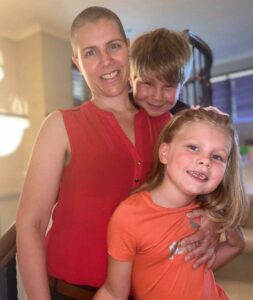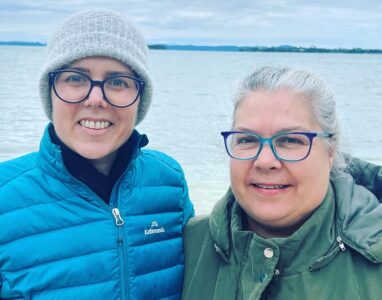
Nosky Linde talks about her cancer journey which has the potential to impact thousands of other New Zealanders and help them access potentially life-saving information
Recent evidence suggests that each year, 174 women in New Zealand are diagnosed with cervical cancer, and tragically, 81 of them lose their battle with the disease.
Cervical cancer ranks as the 12th most common cancer among women in New Zealand and stands as the fourth most prevalent cancer in the age group of 15 to 44.
One of these unfortunate statistics is Nosky Linde – an East Tamaki-based single mum to Lorren (6) and Dylan (9).
“No one believes it could happen to them. I always thought it would happen to other people. Certainly, in my family there is very little history of cancer and being an active and relatively healthy person, I never thought that I would become a statistic,” says Nosky.
However, Nosky is far more than a statistic. She is a resilient woman with an enthusiasm for exploring. She is quick-witted and extremely loyal and kind towards her friends and family.
More than anything, she has an unwavering will to live, no matter how cruel the suffering, or how many ‘doom and gloom’ doctors’ appointments she must endure.
“I want to live,” says Nosky, “I have two children who need their mum and there are all the big and small moments I want to be there for. There are also things I want to experience. I haven’t travelled enough; I haven’t done enough and there are too many sunsets that I haven’t seen,” she says.
Mid-2022, Nosky started having lower abdominal pain. On August 25, she was informed she had cervical cancer. Having immigrated to New Zealand in November 2018, Nosky’s story mirrors that of many other Kiwi newbies.
“I was so caught up in making a life in a new country, focusing on my career and looking after my children, I neglected looking after my own health,” she says.
A CT scan and MRI followed on September 21 and confirmed she was facing 4b cancer with metastasis to her lungs.
Nosky is cared for by her mother, Jalinda van der Westhuizen, a retired nurse. Jalinda explains that the medication and care plan for Nosky is relentless.
“Every day is different and at times we must change the meds to suit where her body may be on any given day. I also believe in a holistic care plan for Nosky. We include traditional and alternative medicines and treatments,” says Jalinda.

Despite this extensive treatment plan, Nosky’s misfortune has been mounting. Following four gruelling rounds of chemotherapy, a blemish was detected on her spine which required her to stop chemotherapy and begin radiation treatment.
However, after 15 days, an excruciating sensation began appearing in her right collarbone. The cancer has spread into her bones with new tumours forming on her spine and windpipe causing severe pain and discomfort.
She underwent chemotherapy to combat her cervical cancer, leading to a successful reduction of the malignancy within the cervix. However, this procedure gave rise to tumours on her spine, bones and lungs.
“I think the sad thing is that when you are diagnosed, you are so desperate for anyone to help you, you don’t read the fine print which states that chemo can cause secondary cancers,” Nosky says.
“It is rare, but once again, I was that statistic. You desperately want to trust the process. You believe that doctors will fix you because, after all, they deal with cancer every day, and this is your first rodeo, but the truth is – every cancer is different, and every patient is unique.”
Nosky shares her recent discovery that there’s a test available to determine the effectiveness of chemotherapy for people’s specific cancer and identifies the most suitable chemotherapy type.
She highlights an advanced test called FoundationOne, which is not commonly offered but urges fellow cancer patients to inquire about it before embarking on their initial treatment.
“Although this test comes with a hefty price tag of A$9000 [$9813.51], its potential to save lives makes it a worthwhile investment,” says Nosky.
“I regret not having known about it sooner, as it might have prevented my cancer from spreading so aggressively. Such knowledge is truly invaluable.”
As a result of this test, Nosky has been diagnosed with a highly uncommon mutation known as “FGFR3-TACC3 fusion,” typically associated with bladder cancers. The suggested treatment for this specific mutation is not covered by funding and is not available in New Zealand.
In the interim she has discovered another test called Exacta Plus which offers comprehensive insights into chemo, drug and botanical sensitivities tailored to specific cancers.
This test encompasses everything from ordering and paperwork completion to interpreting the test results and providing a treatment plan based on those findings, including dietary and botanical recommendations for cancer pathways. The cost of this test is A$9435.
“I firmly believe that this test should become standard practice for all cancer patients, ensuring targeted treatment right from day one,” Nosky believes.
Nosky has set up a Givealittle page to raise funds for her visit to the ‘Hope 4 Cancer’ clinic in Mexico, known for its innovative and groundbreaking cancer treatments. The three-week programme includes a 12-month follow-up and provides three months’ worth of medication to take home.
The total cost, which includes flights from Auckland, amounts to $90,000. Donations of $32,000 have been gifted so far.
Jalinda acknowledges that this is a substantial expense, recognising the financial burden of cancer.
“It would be great if the Government could offer cancer patients more than just the standard chemo and radiation therapy – which is really just one arrow in the quiver when it comes to treating this disease.”
Throughout this journey, Nosky has found herself surrounded by a supportive community, including doctors, nurses, hospice caregivers and advocates at the Cannabis Society who assist with medical cannabis.
“There is so much care and love on this journey. It has shown me that I am stronger than I ever imagined.
“This experience has revealed the remarkable kindness of my children and I consider my mother a superhero and credit her with a lifetime of preparation for this challenge. All things considered, I am lucky,” she says.
Nosky hopes that by telling her story, it will help other cancer sufferers to find the information they may be searching for.
- Donations to help Nosky get to Mexico can be made at www.givealittle.co.nz/cause/noskys-cancer-healing-fund.










